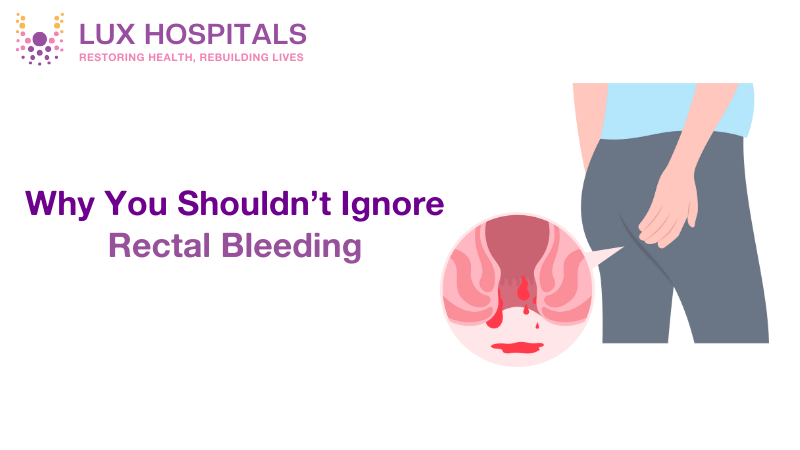6 Reasons You Shouldn’t Ignore Rectal Bleeding – Warning Signs & Risks

Rectal bleeding is a common yet often alarming symptom that many people tend to overlook. While occasional spotting may not be a cause for immediate concern, persistent or heavy rectal bleeding could signal an underlying medical condition. Ignoring this symptom can lead to complications, delaying necessary rectal bleeding treatment and increasing health risks.
This article explores six critical reasons why you should never ignore rectal bleeding, the potential causes, symptoms, and available treatments.
1. It Could Indicate Hemorrhoids or Anal Fissures
One of the most common reasons for rectal bleeding is hemorrhoids swollen veins in the rectal or anal area. They can cause discomfort, itching, and bright red bleeding, especially during bowel movements. Anal fissures, which are small tears in the anal lining, can also lead to rectal bleeding and pain. While these conditions are usually not severe, chronic bleeding may require medical intervention.
When to Seek Help:
- If the bleeding is persistent or worsens over time.
- If you experience severe pain or swelling.
- If over-the-counter medicine for rectal bleeding fails to relieve symptoms.
2. It May Be a Sign of Inflammatory Bowel Disease (IBD)
Chronic rectal bleeding can result from conditions such as ulcerative colitis and Crohn’s disease. The digestive tract becomes inflamed as a result of these inflammatory bowel disorders, which can result in ulcers, discomfort, and chronic diarrhea. IBD can significantly affect your quality of life and necessitate lifetime care if left untreated.
Warning Signs:
- Persistent diarrhea with blood or mucus.
- Abdominal cramps and weight loss.
- Fatigue and malnutrition due to nutrient absorption issues.
If you experience these symptoms, consulting a doctor for proper rectal bleeding treatment and diagnosis is crucial.
3. It Could Be a Symptom of Colorectal Cancer
Colorectal cancer is one of the most serious rectal bleeding causes, especially in older adults. Even while not all rectal bleeding is associated with cancer, any bleeding that persists or cannot be explained has to be treated right away. Timely screenings are crucial since early discovery increases survival rates.
Key Risk Factors:
- A family history of colorectal cancer.
- Unexplained weight loss and fatigue.
- Changes in bowel habits, such as diarrhea or constipation.
If you notice blood in your stool frequently, don’t hesitate to seek a professional evaluation.
4. Rectal Bleeding Can Lead to Anemia
Iron deficiency anemia, which causes pale complexion, weariness, and dizziness, can be brought on by chronic rectal bleeding. Over time, even mild bleeding can have a substantial negative influence on general health by lowering red blood cell numbers.
Symptoms of Anemia Due to Rectal Bleeding:
- Weakness and fatigue.
- Shortness of breath.
- Pale skin and brittle nails.
Your heart and other organs may be impacted if anemia is not treated. Iron supplements and a proper medical checkup may be required.
5. It Might Be Due to Gastrointestinal Infections or Diverticulosis
Certain bacterial or viral infections can inflame the digestive tract, leading to rectal bleeding. Similarly, diverticulosis—a condition where small pouches form in the colon—can cause bleeding when they become inflamed or infected.
Other Symptoms to Watch For:
- Fever and abdominal pain.
- Changes in bowel habits.
- Nausea and vomiting.
Complications such as diverticulitis or infections can be prevented by promptly obtaining medical attention and using the appropriate medicine for rectal bleeding.
6. Ignoring Rectal Bleeding Can Delay Proper Treatment
Even though some rectal bleeding episodes go away on their own, excessive or protracted bleeding should never be disregarded. Identifying the root rectal bleeding causes early can prevent complications and improve treatment outcomes.
When to See a Doctor:
- If rectal bleeding lasts more than a few days.
- If you experience pain, fever, or significant changes in bowel movements.
- If there is a dark, tarry stool (which may indicate bleeding from the upper gastrointestinal tract).
Conclusion
Rectal bleeding cannot be neglected. Either because of hemorrhoids or inflammatory bowel disease, infection, or other more dangerous conditions like colorectal cancer, immediate medical evaluation is essential. Understanding the symptoms of rectal bleeding and proper medical intervention can make a big difference to your health.
If you or a loved one notice rectal bleeding, see a medical professional for accurate diagnosis and appropriate rectal bleeding treatment. The earlier you get treatment, the fewer complications will arise, and pain will be relieved. Disregard warning signs at your own risk—your health is worth it!
Frequently Asked Questions
Rectal bleeding can be caused by hemorrhoids, anal fissures, inflammatory bowel disease (IBD), gastrointestinal infections, diverticulosis, and colorectal cancer.
You should seek medical attention if rectal bleeding persists for more than a few days, is accompanied by pain, fever, or weight loss, or if you notice dark, tarry stools.
Minor cases of rectal bleeding, such as those caused by hemorrhoids or anal fissures, may stop on their own. However, persistent or heavy bleeding requires medical evaluation.
Doctors may use a physical exam, stool tests, colonoscopy, sigmoidoscopy, or imaging studies to determine the cause of rectal bleeding.
Treatment depends on the cause, including dietary changes, medications, minimally invasive procedures, or surgery for severe cases.
Yes, a high-fiber diet can help prevent constipation and straining, reducing the risk of hemorrhoids and anal fissures, which are common causes of rectal bleeding.
No, rectal bleeding can have many causes, but a doctor should evaluate persistent or unexplained bleeding to rule out serious conditions like colorectal cancer.




















